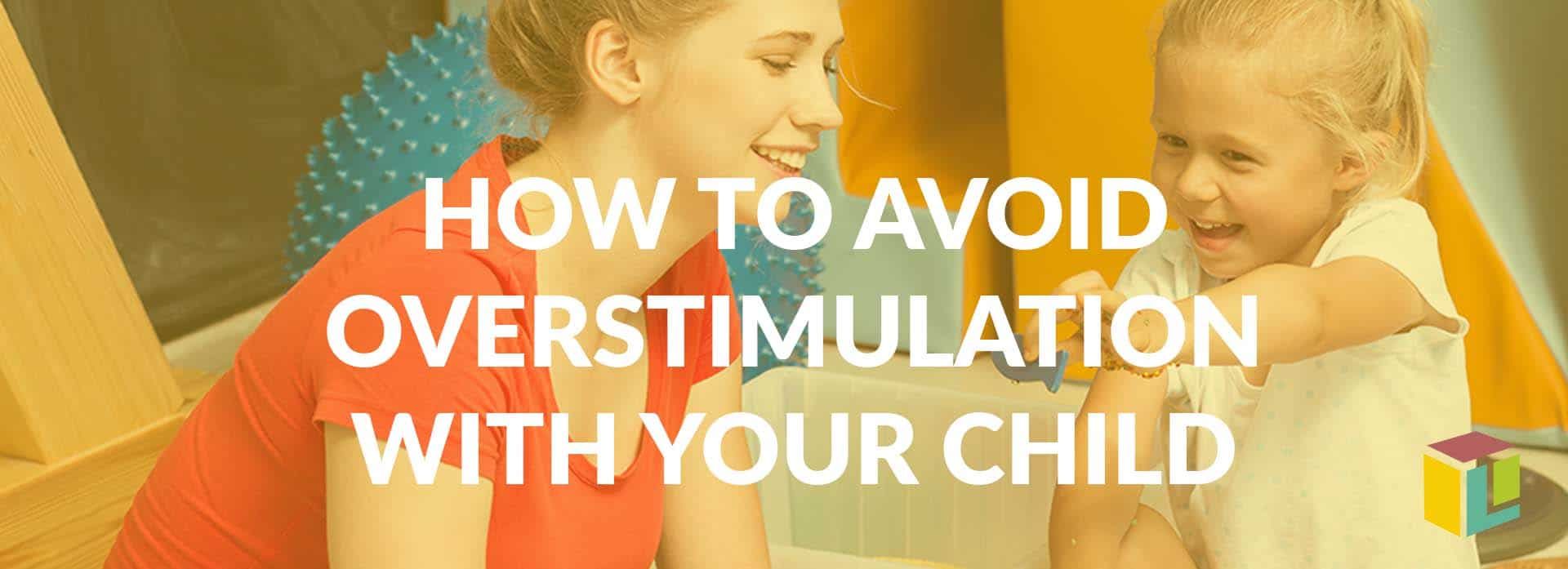How To Avoid Overstimulation With Your Child
Infant Overstimulation
Did you know that the same stress that affects you from overstimulation – an overflowing email inbox, piles of laundry, making dinner – also affects your child? What begins as a simple game of peek-a-boo and laughter descends into your infant looking away from you and trying to comfort herself. Do not take such behavior personally. She is simply overstimulated.
Bear in mind that an infant’s disposition, like an adult’s, varies. Some adults are outgoing and crave attention, while others are easygoing and can take attention or leave it, and still others need a great deal of quiet time between social interactions. The same is true for your infant.
Monitor your baby’s reactions during playtime to determine what she finds pleasurable and what her limitations are. When you notice signs of overstimulation, try calming her by speaking softly or simply holding her. Ignoring your baby’s distress leads to her withdrawing from you at a time when you should be bonding.
Toddler Overstimulation
Young children can, simultaneously, look forward to an event and end up in tears over the event. Look at pictures of your own childhood birthday parties. Almost certainly either you or one of your guests ended the day in tears. Toddlers have a limited number of ways in which to express themselves and often do not understand the cause of their dismay, even after they are in total meltdown.
While some parents may encourage their child to “soldier on” through the experience, especially if they have just paid an exorbitant amount of money for a bouncy house, a face painter and a clown, this course of action will only lead to more hysterics. Too many choices and too much attention often lead to overstimulation.
Know your toddler’s limits and pay attention to the signs that he or she is overstimulated. Often, toddlers do not need a nap as much as they need to be removed from the commotion for a while. Take him or her to a quiet place, whether it is a separate room in the house or a quiet part of the backyard.
Do not chastise your child for missing the excitement. Sit quietly, if that is what he or she prefers, or talk about fun memories, such as the time Daddy fell into the river while fishing or the time Mommy forgot her own lunch and had to run back to the house before going into the office.
Once your child has calmed down, ask if he or she is ready to return to the festivities and be prepared to accept whatever he or she chooses. Giving your child some control over his or her level of stimulation enables your child to return to the occasion happy rather than being dragged back to the party kicking and screaming.
How To Recognize Overstimulation
Just as with adults, toddlers react to overstimulation in varying ways, depending upon their personalities. While some toddlers thrive in the limelight, others just want to sit on your lap and have you read to them.
Overstimulated toddlers exhibit one or more of the following behaviors:
- When seemingly small things that your child would normally ignore induce a bout of cranky behavior, he or she is overstimulated. Using the birthday party example, your normally easy-going daughter may become angry with her best friend if she has the same design painted on her face that your daughter chose. Even though the two friends often dress alike and wear their hair in the same style, your daughter is anxious and irritated with the commotion, not the face painting.
- If your child starts pushing his friends into the bouncy house walls, he is expressing the fact that too many activities are occurring at one time for him to process. If your child takes a balloon animal from one of his friends and pops it, he is telling you in the only way he can that he needs a break from the excitement. Because he is in an aggressive mood, he may resist your attempts to quiet him at first. But you will both be much happier in the long run if you nip aggressive behavior in the bud.
Overly emotional reactions. This behavior is the opposite extreme of aggressiveness. If your child bursts into tears because she wanted strawberry ice cream to go with her cake, but you only have chocolate and vanilla, she is expressing the fact that she feels out of control. Rather than reminding her that she hates strawberry ice cream, allow her to choose one of her dolls to join her for cake and ice cream. Remove her from the activity for a short time. She will return feeling more in control of her situation with her favorite toy beside her.
Zoning out/hyperactivity. These two behaviors are opposite sides of the same overstimulation coin. Some children zone out or turn inward to escape the over-abundance of activity surrounding them. Other children feel the need to control the chaos by adding more chaos of their own. In either situation, parents need to be alert to these behavioral cues and act accordingly.
Forcing a child to re-engage in activities he or she is trying to escape is counterproductive. Allow your child some downtime, just as you escape a hectic workday by closing your eyes for a few minutes. Conversely, disciplining a hyperactive child uses negative behavior to escalate negative behavior. Instead, pull him aside for a few minutes of quiet time alone with you. He may resist at first since he is no longer the center of attention, but he will calm down and you will de-escalate the situation.
How To Avoid Overstimulation
Just as it is impossible to avoid overstimulation in your own life, you cannot eliminate it entirely from your child’s life. The following suggestions reduce the likelihood of frequent overstimulation:
- Limit extramural activities. Even infants can have too many extramural activities, especially around the holidays when every family member wants to hold the baby and play with her. When she starts to fuss over too much handling, take her to a quiet room for a nap. Toddlers’ schedules fill up quickly when you have his t-ball practice, daycare or pre-school activities and friends over after dinner to play outside. If your toddler exhibits signs of stress at the end of his day, eliminate a few activities from his schedule.
- Schedule simple playdates. Instead of creating elaborate playgroups for your infant such as mommy/baby yoga, plan simple events with one or two close friends. Each baby can then play or rest as she chooses among people she recognizes. Toddler playdates run the gamut from banging pots and pans with spoons to chasing one another around in a rousing game of tag. In between these bursts of activity, make sure you schedule some quiet time such as reading a story.While children need to burn off excess energy, they also need sufficient downtime to recharge.
- Give your child alone time. Infants and toddlers alike need rest so that their brains can develop and process all that they have learned during the day. “Rest” and “sleep” are not necessarily synonymous. If your toddler is content to read a book or color rather than nap, those activities also count as rest. When you are constantly in the room with your child, his or her attention will be drawn towards you, so it is important to give him or her rest from you as well as activity.
Striking The Right Balance
It is never easy to know where the line lies between enough activity to keep a child from being bored and so much activity that he or she is stressed. Understand your child’s personality. Observe his or her reactions to certain activities and events.
Take your cues from his or her behavior, and you will learn how to keep your child engaged and learning without overstimulation.
At Lexington, we believe in member success and take steps to avoid overstimulation for all our members. Our highly trained and empathetic staff members are part of the reason why people choose Lexington. If you are searching for solutions, contact us today.
If you want to find out more about this and other subjects, read the most recent blog.

